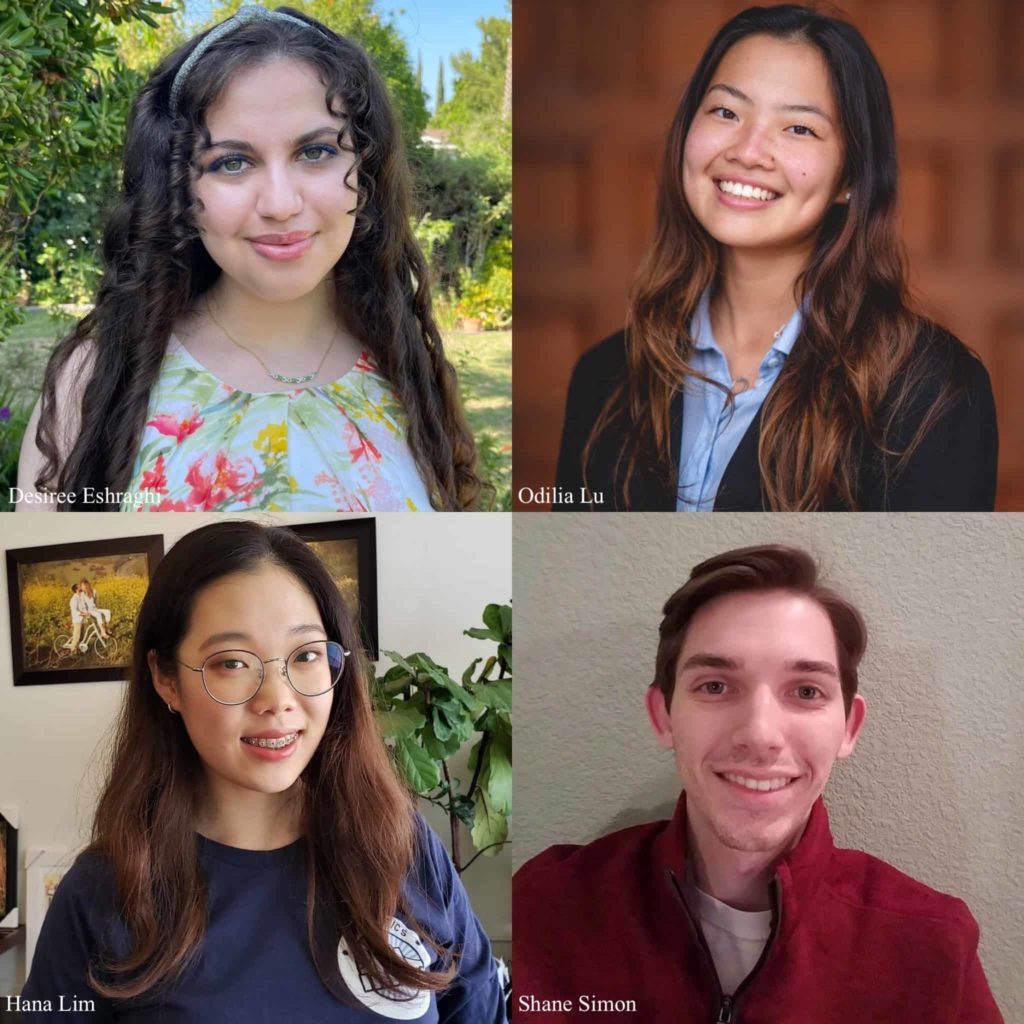
Thank you to the following labs and research groups who sponsored students:
- Brain Mapping Center
- Cahill Lab
- Cole Lab
- Ghiani/Colwell Lab
- Izquierdo Lab
- Kuhn/Bookheimer Lab
- Lord Lab
- Neurobiochemistry Group
- Neuromodulation
- SCAN Lab
- Student Wellness Commission’s Student Education & Research on Contemporary Health
- UCLA Cannabis Research initiative
- UCLA Gambling Studies Program
- UCLA Late-Life Depression, Stress, and Wellness Program
- UCLA QUIT Mobile
Many thanks to Elaine Clarke and Maryam Abdallah for serving as breakout session moderators.
Finally, our sincere gratitude to our poster judges Christina Palmer, Timothy Fong, Tara Peris, and Chris Evans.
The 2021 conference was transitioned online and was hosted through the Center for Open Science. Please visit this link for the conference meeting page and to view and download student posters: https://osf.io/meetings/semelugc21/
Award Recipients
Congratulations to the following recipients of the three Best Poster Awards:

Alice Chien, Sponsor: Steven Cole
Gene regulatory implications of same-sex romantic relationships: Results from the National Longitudinal Study of Adolescent to Adult Health
Desiree Eshraghi, Odilia Lu, Hana Lim, and Shane Simon, Sponsor: Burton Cogwill
Evaluating the impact of college health programming on the health and well-being of students from marginalized communities


Wenting Hu Sponsor: Robert Suddath
The Impact of Online Learning on Mental Health during COVID-19 Pandemic
Posters
See Full List
Abraham Caballero, Not all are one and the same: Substance use differences in Hispanics seeking gambling treatment (link)
Cara Cavarretta, National survey of cannabis and cannabinoid use and its self-reported effects on psychological and dermatological symptoms (link)
Hye In Cha, Blue and red-shifted light and neuronal activation (link)
Alice Chien, Gene regulatory implications of same-sex romantic relationships: Results from the National Longitudinal Study of Adolescent to Adult Health (link)
Ruth Chincanchan, Caudal Connectivity Response in Patients with Major Depressive Disorder (MDD) Undergoing repetitive Transcranial Magnetic Stimulation (rTMS) Treatment (link)
Emily Chou, Odilia Lu, Shane Simon, Desiree Eshraghi, Hana Lim, Evaluating the impact of college health programming on the health and well-being of students from marginalized communities (link)
Kanak Das, Sex Differences Across Performance Measures in Stimulus Based Reversal Learning (link)
Wenting Hu, The Impact of Online Learning on Mental Health during COVID-19 Pandemic (link)
Helena Huynh, Measuring Changes in Social Communication Behaviors in Response to Treatment in Children with Autism Spectrum Disorder (link)
Ella Jolley, Using Pupillometry to Predict Clinical Outcomes for Transcranial Magnetic Stimulation in Major Depressive Disorder (link)
Yelena Malkhasyan, Music, tones, and noises promote and enhance NREM sleep: A Systematic Review (link)
Jason Miller, Opposing Effects of Mu-Opioid Receptors in Dopamine Receptor Expressing Neurons (link)
Cierra Nakamura, The Effects of COVID-19 on Time Spent on Screens (link)
Christopher Pleman, Heart Rate Variability as a Major Depressive Disorder Biotype and Predictor of Repetitive Transcranial Magnetic Stimulation Treatment Outcome (link)
Vaidehi Ramanarayanan, Effect of Tai Chi on quality of life in older adults with major depression (link)
Sapna Ramappa, Observed Sensory Modulation Behaviors and Their Relationship to Parent- and Child-Reports in Children and Adolescents with Autism Spectrum Disorder (link)
Joanne Seung, Socio-cultural contributions to differential RNA gene expression in Korean American young adults (link)
Sophia Shaka, Increased Proliferation of Human Neural Stem Cells During and After Space Flight (link)
Andrew Swenson, Transcranial Focused Ultrasound as a Novel Noninvasive Cognitive Neural Prosthetic (link)
Victoria Tran, Influence of Microgravity on the Proliferation of Oligodendrocyte Progenitor Cells (link)
Quynh Vo, Adapting Screening and Brief Intervention (SBI) to Prevent Substance Use Disorder for Telehealth using Mobile and Multimedia Technologies for Multilingual, Low-Income Primary Care Patients in FQHCs (link)
